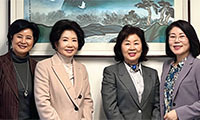▶ By Choe Hun-sik
Why were those responsible for this atrocity not prosecuted after the war? Shamefully, it was not uncommon for reigning monarchs of the Choson Kingdom of Korea (1392-1910) to solicit the favor of Ming Chinese emperors by sending certain numbers of virgins to China as a compulsory requirement. The comfort system appeared during a time when the world’s organization regarded prostitution as a natural by-product of military movements. The Roman Empire made use of a similar system for its armies. The Spanish brought more than 1,000 prostitutes with them when they invaded the Netherlands in the 16th Century. The British military placed a register for prostitutes in India, providing compulsory medical examinations and toiletries. During World War II, the German Army installed military brothels in occupied territories.
Sexism and racism might have also affected the Allies’ decision not to prosecute those responsible for the atrocity. For example, when the Allies returned to Dutch Indonesia, the Dutch discovered that the Japanese occupying Batavia, now known as Jakarta, had forced approximately 50 interned Dutch women and 100 local women into prostitution. The Dutch tried Japanese officers and agents for the forced prostitution of the Dutch women, but not of the local women. The Dutch trials, which had taken place in 1948, were not common knowledge until 1992, when the Hague released the records to the public with the condition that names of the Dutch victims would remain sealed until 2025. No other Allied force is known to have considered forced prostitution as a war crime.
Why has it taken so long for the women to make themselves available, even for some sort of restitution? On a personal level, chastity was always revered in Asian countries. The loss of virginity meant a life of ostracism with little chance of marriage. The attitude in turn led to poverty, because in most Asian countries, a woman’s major or sole source of support came from her husband. One woman, X, had begun the process of becoming a nun before the war. During the war, she was one of the Dutch women forced into prostitution. Although she did not testify at the war crimes trial, she told the Catholic church of her ordeal. As a result, the Catholic church declared her unacceptable as a nun. Indeed, most of the victims seem to have concealed the crimes committed against them.
After World War II, while Japan was recovering economically, war broke out between South Korea and North Korea, with China intervening on behalf of the North and a UN-organized force intervening for the South. Korea and Japan did not finalize a treaty of settlement for Korea’s claims until 1965. Because of the devastation in the Pacific during World War II and the Korean War, the documentation of claims was then almost impossible. Without U.S. involvement, Japan continued to show reluctance to apologizing, presumably on the grounds that no status of war between colonial Korea and imperial Japan ever existed. Korea, like other Asian countries, agreed to accept economic grants as settlements for all claims.
Japan has conveniently used the treaty as a shield against any subsequent individual claims. In the same way, I experienced problems in the courts in the 1990s regarding a dispute over land ownership that was clouded by the devastation of the war. During the 1970s and 1980s, Koreans experienced an economic boom, and also the most profound emergence of women’s rights groups in Asia. The plight of the comfort women became a hot issue in the 1990s. They deserve to be given restitution for everything that they have suffered.
Forced prostitution did not come to an end with World War II. During the recent Bosnian conflict, the media was full of reports that the Serbian military engaged in mass rape and forced prostitution of Bosnian Muslim women. The comfort women, as victims of atrocities, must serve as examples of how we must bring these crimes to light, and bring aid and comfort to other women who have been similarly brutalized.
As a final note, I would like to cordially take this opportunity to offer my delayed congratulations to The Korea Times for its 50th Birthday (Nov. 1), and thank all its people who are living by the pen, past and present. In particular, I want to extend my thanks to Mr. Bang Tae-yung, the former editor, who printed my first article, "A Glance At Post Liberation," on Aug. 15, 1985.
The writer is former SOFA Advisor at Camp Casey. He resides in Seoul.
스마터리빙
more [ 건강]
[ 건강]이제 혈관 건강도 챙기자!
[현대해운]우리 눈에 보이지 않기 때문에 혈관 건강을 챙기는 것은 결코 쉽지 않은데요. 여러분은 혈관 건강을 유지하기 위해 어떤 노력을 하시나요?
 [ 건강]
[ 건강]내 몸이 건강해지는 과일궁합
 [ 라이프]
[ 라이프]벌레야 물럿거라! 천연 해충제 만들기
 [ 건강]
[ 건강]혈압 낮추는데 좋은 식품
[현대해운]혈관 건강은 주로 노화가 진행되면서 지켜야 할 문제라고 인식되어 왔습니다. 최근 생활 패턴과 식생활의 변화로 혈관의 노화 진행이 빨라지고
사람·사람들
more많이 본 기사
- 레이건 前대통령 장남 마이클 레이건 별세… “부친 유산지킨 수호자”
- 李대통령 “한중관계, 감정에 좌우되지 않게 관리…많은 진전”
- 張, ‘계엄·尹 결별’ 위기 정면돌파 시도…계파갈등 ‘뇌관’ 여전
- 정의선, 젠슨 황 회동…엔비디아·삼성·LG·퀄컴과 전방위 협력 행보 [CES 2026]
- 트럼프 행정부, 미네소타서 “최대 규모” 이민단속…주정부 반발
- 베네수엘라 석유 수출 재개되나… “셰브론, 유조선 투입”
- 美, 1만5천 달러 비자 보증금 적용 국가 38개로 확대…베네수 포함
- 트럼프 “베네수産원유 최대 5천만배럴 美 인도”…석유이권 속도전
- 트럼프, 與의원들에 “중간선거 꼭 이겨야…지면 탄핵소추당할것”
- ‘결혼 28년 차’ 오연수, ♥손지창과 행복한 줄 알았더니.. “걱정없는 집 없어”
- 폭우 후 기온 내려가 주말까지 맑고 쌀쌀
- 연방정부, 5개 주에 저소득층 아동 예산 보류… “사기 우려”
- 렌트 3% 상한시대… LA 주거정책 ‘대변혁’
- ‘안면 인식’으로 불체자 확인·체포한다
- [신년 집중기획/ 2026 새해 이렇게 바뀐다 - 주택] 아파트 냉장고 제공 ‘의무화’
- 브라운대·MIT 총격범 “3년 계획…사과 않을 것” 영상
- 전직 OC상의 회장 연말 송년 모임 가져
- “美국무, 그린란드 군사작전 검토설 부인… ‘매입이 목표’ 발언”
- 니콜 키드먼·키스 어번, 공식 이혼…19년 결혼 마침표
- [CES 2026] 젠슨황 “알파마요, 테슬라와 생태계 달라…곧 무개입 자율주행”
- Ramen 아닌 Ramyeon…옥스퍼드사전에 K단어 2년 연속 올라
- “위대한 인물” NYT, 故 안성기 부고 기사.. ‘장남’ 안다빈 공유
- [화제] 참치 한 마리에 ‘325만불’… 역대 최고가 경신
- 빛 잃은 ‘보석의 제왕’… 금 2배 뛸때 다이아 반토막
- “작년 LA 산불지역 재건축 착수 주택 ⅓뿐…비용·절차 난항”
- 대법원, 9일 중대사건 판결…상호관세 운명 결정되나
- ‘기다림’이 만들어낸 동심의 세계⋯김인옥 작가 개인전
- “그동안 MLB 볼 판정 부정확→ABS 진작 필요했다” 美 CBS 냉철 분석
- CES 2026 ‘통합 부산관’ 운영…13개 기업 혁신상 수상
- 공화 현역 7선의원 별세…하원서 공화 ‘아슬아슬’ 다수당
- 머스크의 xAI, 엔비디아 업고 200억달러 자금 추가 조달
- ‘한국 아시아 1위도 보인다’ 일본 1월 피파랭킹 하락 확정 ‘3계단 차이’
- 송지우, 목욕탕서 팬과 아찔한 만남.. “나체로 라이브 감행”[우발라디오]
- “생닭 뜯는 故 안성기, 경악스러워”..배현진, 조문 태도 논란
- “물가와 상관없다” 더니… 트럼프, … 1
- 지역사회 AI데이터센터 반대 확산…중간선거 쟁점 조짐
- TSA, 승객정보 ICE 공유 국내선 탑승자들도 체포
- “어머니의 마음으로 아동 돕기… 28년을 이어온 나눔”
- 혈압·혈당·콜레스테롤 개선하려면 체중 3.5㎏ 줄여라
- ‘1위 유튜버’ 미스터비스트, “뉴진스 도와달라” 요청에 남긴 한 마디
- 故 안성기 장남인 미술가 안다빈, 아버지를 보내며..
- “美, 베네수와 원유 수출방안 논의”…석유 제재 해제 수순 전망
- 美국무부 “이것은 우리의 반구”…서반구 장악 의지 노골화
- “따뜻한 떡국 나누며 건강 기원했어요”
- ‘CES 2026’ 오늘 라스베가스에서 개막
- 항공 여행객 정보 ICE와 공유 “비시민권자 비행기 탑승시 주의”
- 아동 예방접종 권장 백신 17→11종 축소
- 메타, 디스플레이 스마트안경 글로벌 출시 연기…”재고 부족”
- 트럼프 “석유회사들 만날 것”…베네수 석유이권 확보 속도내나
- 포드·GM, 작년 美신차판매 6%↑…도요타·현대차도 선전
1/5지식톡

-
 미 육군 사관학교 West Poin…
0
미 육군 사관학교 West Poin…
0https://youtu.be/SxD8cEhNV6Q연락처:wpkapca@gmail.comJohn Choi: 714-716-6414West Point 합격증을 받으셨나요?미 육군사관학교 West Point 학부모 모…
-
 ☝️해외에서도 가능한 한국어 선생님…
0
☝️해외에서도 가능한 한국어 선생님…
0이 영상 하나면 충분합니다!♥️상담신청문의♥️☝️ 문의 폭주로 '선착순 상담'만 진행합니다.☎️ : 02-6213-9094✨카카오톡ID : @GOODEDU77 (@골뱅이 꼭 붙여주셔야합니다…
-
 테슬라 자동차 시트커버 장착
0
테슬라 자동차 시트커버 장착
0테슬라 시트커버, 사놓고 아직 못 씌우셨죠?장착이 생각보다 쉽지 않습니다.20년 경력 전문가에게 맡기세요 — 깔끔하고 딱 맞게 장착해드립니다!장착비용:앞좌석: $40뒷좌석: $60앞·뒷좌석 …
-
 식당용 부탄가스
0
식당용 부탄가스
0식당용 부탄가스 홀세일 합니다 로스앤젤레스 다운타운 픽업 가능 안녕 하세요?강아지 & 고양이 모든 애완동물 / 반려동물 식품 & 모든 애완동물/반려동물 관련 제품들 전문적으로 홀세일/취급하는 회사 입니다 100% …
-
 ACSL 국제 컴퓨터 과학 대회, …
0
ACSL 국제 컴퓨터 과학 대회, …
0웹사이트 : www.eduspot.co.kr 카카오톡 상담하기 : https://pf.kakao.com/_BEQWxb블로그 : https://blog.naver.com/eduspotmain안녕하세요, 에듀스팟입니다…
케이타운 1번가
오피니언
 민경훈 논설위원
민경훈 논설위원도널드 W 부시와 이라크 전의 추억
 황의경 사회부 기자
황의경 사회부 기자 타국에서, 다시 ‘우리’를 생각하다
 박원곤 이화여대 북한학과 교수
박원곤 이화여대 북한학과 교수 [백상논단] 붉은 말의 해, 한반도에 다시 오는 분기점
 홍용희 수필가
홍용희 수필가 [화요칼럼] 내 안의 바위
 송용창 / 한국일보 논설위원
송용창 / 한국일보 논설위원 [지평선] 베네수엘라 석유 암투
 조동례
조동례 ‘달 도둑’

Crinks 세력이 크게 꺾이는 그런 해가…
 윤경환 서울경제 뉴욕 특파원
윤경환 서울경제 뉴욕 특파원 60년 만 ‘투자 귀재’ 없는 첫 주
 데이빗 이그나티우스 워싱턴포스트 칼럼니스트
데이빗 이그나티우스 워싱턴포스트 칼럼니스트 [데이빗 이그나티우스 칼럼] 신년맞이 퀴즈: 2026년에는 좋은 일이 있을까?
1/3지사별 뉴스

맨하탄 연방법원에 출두한 마두로 대통령 “나는 납치됐다”
미군에 의해 체포돼 부인과 함께 미국으로 압송된 니콜라스 마두로 베네수엘라 대통령이 5일 맨하탄 연방법원에 처음 출두해 모든 범죄 혐의를 부인…
이민단속에 안면인식 앱까지 동원

“헌법 무시”Vs“안보 강화”
미국이 3일 나콜라스 마두로 베네수엘라 대통령을 군사 작전으로 체포한 사건과 관련해, 워싱턴 지역 정치권은 상반된 반응을 보이고 있다. 정치인…
DC 보안 강화, 마두로 체포로 인해 ‘초비상’

‘안면 인식’으로 불체자 확인·체포한다
트럼프 행정부의 초강경 이민 단속 기조 속에 불법체류자 단속을 위해 안면 인식 기술이 본격적으로 활용되고 있어 논란이 커지고 있다. 4일 월스…
중부 캘리포니아 ‘한인 이민사’ 나왔다




















































.png)


댓글 안에 당신의 성숙함도 담아 주세요.
'오늘의 한마디'는 기사에 대하여 자신의 생각을 말하고 남의 생각을 들으며 서로 다양한 의견을 나누는 공간입니다. 그러나 간혹 불건전한 내용을 올리시는 분들이 계셔서 건전한 인터넷문화 정착을 위해 아래와 같은 운영원칙을 적용합니다.
자체 모니터링을 통해 아래에 해당하는 내용이 포함된 댓글이 발견되면 예고없이 삭제 조치를 하겠습니다.
불건전한 댓글을 올리거나, 이름에 비속어 및 상대방의 불쾌감을 주는 단어를 사용, 유명인 또는 특정 일반인을 사칭하는 경우 이용에 대한 차단 제재를 받을 수 있습니다. 차단될 경우, 일주일간 댓글을 달수 없게 됩니다.
명예훼손, 개인정보 유출, 욕설 등 법률에 위반되는 댓글은 관계 법령에 의거 민형사상 처벌을 받을 수 있으니 이용에 주의를 부탁드립니다.
Close
x